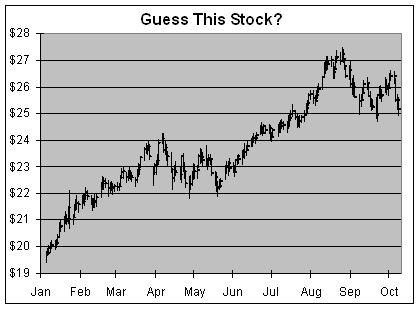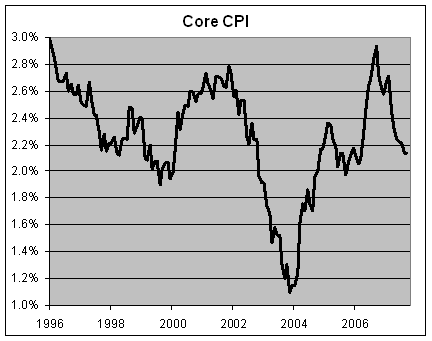Archive for 2007
-
Guess This Stock?
Eddy Elfenbein, October 17th, 2007 at 11:29 am
Give up? -
The Free Market and Point Spreads
Eddy Elfenbein, October 17th, 2007 at 11:03 amThere will be an interesting test of the free market this weekend. The best team in the NFL, the New England Patriots, is playing the worst team, the Miami Dolphins (although the Rams may challenge that title before the season ends). The game is in Miami.
I find these things interesting because a point spread is no different from how the stock market works. It’s the judgment of the free market. The point spread for the game is 17 which is about as high as you’ll ever see for an NFL game. Many years ago, you could see games with over 20 points but those days are long gone.
Still, 17 points seems on the low side. New England’s worst game this year was a 17-point win. I also noticed that the Tradesports contracts to cover are up 53%. Perhaps the line will move. I wonder if the odds makers are simply afraid of an event that appears to be at the margins.
The question comes up in finance too. Basically, how do you handle a rare event? There just isn’t that much data to analyze when two teams like this meet. For now, the market seems to have selected caution. But how will sophisticated investors (gamblers) handle this? -
Core Inflation Is Still Tame
Eddy Elfenbein, October 17th, 2007 at 10:28 amThe government reported that headline inflation rose 0.3% last month. The good news is that the core rate, which excludes food and energy, is still well-behaved.
The core rate comes in for a lot of criticism but it’s probably the best short-term indicator of the Fed’s performance. The 12-month core rate has ranged between 1% and 3% for over 10 years.

-
A Closer Look at Goldman’s Earnings
Eddy Elfenbein, October 16th, 2007 at 2:19 pmLast month, Goldman Sachs (GS) reported amazing earnings. Maybe too amazing:
Much of the focus is on Goldman’s trading revenue, which totaled a spectacular $8.23 billion, up 70% on the year-earlier quarter. Part of that increase was due to a bold bet that made money if mortgage-backed bonds and financial instruments tied to mortgage values fell in price. Of course, because of the credit crunch, they did plunge in value, netting gains for Goldman that the banks said “more than offset” the losses it saw on the mortgages it was holding.
It’s impossible to trace exactly how that bet against mortgages was made, but the financial filing does describe some very telling details about what made up the enormous $8.23 billion of trading revenue.
The interesting data comes from disclosures in the filing about ‘level 3’ assets and liabilities, which are securities and derivatives that can’t be valued according to observable prices in liquid public markets. Because of their illiquidity, Goldman has to attach values to them chiefly according to in-house models and estimates. -
The Hanger-On
Eddy Elfenbein, October 16th, 2007 at 1:15 pmIn New York Magazine, Duff McDonald looks at how Chuck Prince still has a job.
It’s unlikely the two have ever met, but Citigroup chairman and CEO Chuck Prince and Yankees relief pitcher Luis Vizcaino have something in common. Consider Game 2 in the recent American League divisional playoff series, when Vizcaino was brought into the game in the bottom of the eleventh, after Joe Torre had burned through his best relievers. Nervous Yanks fans could only watch in stupefaction as Vizcaino loaded the bases just in time to face the Indians’ top slugger. How was it that with everything on the line, this was the guy holding the ball? The same is asked about Chuck Prince, who gave up the Wall Street equivalent of a grand slam when Citigroup reported a third-quarter loss of $5.9 billion. The company’s share price now rises when there’s bad news in the hopes that it will lead more quickly to his departure. But despite calls for his ouster from all over Wall Street and from Jim Cramer in this magazine, he’s still very much in the game.
What the critics fail to fully consider is, who would replace him? With no obvious choice from within—and no eager prospects from without—the bank is suffering from what one might call the Vizcaino Condition: Watch and pray he doesn’t do half as badly as everyone expects.I actually talked with McDonald a few months ago about Chuck Prince and Citi. My take is that human nature will always blame a bad plan’s failure on execution, first, and the idea itself last. The reason Citigroup is struggling is that the company, as presently constructed, doesn’t make sense and it should be broken up.
The financial supermarket idea sounds great on paper but it just doesn’t work. It never works, and Citigroup will keep learning that lesson. People can blame Prince all they want, but it’s the idea that has to go.
This year is the 20th anniversary of the movie Wall Street, the big crash and the book Bonfire of the Vanities. How many of today’s first-year MBAs would know that Sherman McCoy’s firm was based on Salomon Brothers? There’s a name that’s completely disappeared, but imagine if Citigroup revived it. Spin it off! According to the most-recent 8-K, Citigroup has assets of over $2.3 trillion. Why so big?
Earlier I pointed out that Citigroup’s Management Committee has 125 members. Is that really needed? The last papal conclave had just 115 members. Sure, both entities have global operations and strong brand names. (Granted, the analogy break down once we come to Bob Rubin, but you see my point). I failed to see the advantage of having a company that’s so large.
Let me also add that I think Sallie Krawcheck will easily become Prince’s replacement. Unfortunately, I don’t think she’ll have any more success. -
Duck and Cover
Eddy Elfenbein, October 16th, 2007 at 11:07 am
The first Boomer applies for Social Security:The baby boomers’ stampede for Social Security benefits has begun.
The nation’s “first” baby boomer, a retired teacher from New Jersey, applied for Social Security benefits Monday, signaling the start of an expected avalanche of applications from the post World War II generation.
Social Security Commissioner Michael Astrue called it “America’s silver tsunami.”
Kathleen Casey-Kirschling applied for benefits over the Internet at an event hosted by Astrue. Casey-Kirschling was born one second after midnight on Jan. 1, 1946, gaining her recognition as the first baby boomer — a generation of nearly 80 million born from 1946 to 1964, Astrue said.
“She’s leading the way for her generation,” Astrue told reporters.
Casey-Kirschling will be eligible for benefits after she turns 62 next year. She said she taught seventh graders for 14 years at a school near Camden, N.J., before retiring and volunteering for the Red Cross in Gulf Coast areas hit by Hurricane Katrina. -
Third-Quarter Earnings Reports
Eddy Elfenbein, October 16th, 2007 at 11:05 amEarnings season gets underway for out stocks this week. On Thursday, Danaher (DHR) and UnitedHealth (UNH) report. Then on Friday, Harley-Davidson (HOG) reports. I think HOG is due for a lift soon.
-
Medtronic Pulls Defibrillation Leads
Eddy Elfenbein, October 15th, 2007 at 10:36 amUgh.
Medtronic Inc. has suspended distribution of its Sprint Fidelis defibrillation leads after identifying five patient deaths in which a lead fracture may have been a contributing factor.
Medtronic shares fell nearly 5 percent in premarket trading.
A defibrillator monitors a patient’s heartbeat; if it senses an abnormal heart rhythm, it delivers an electronic shock to reset the heart to a normal beat. A defibrillation system consists of a device implanted near the shoulder with one or more leads connecting the device to the heart.
Medtronic said Monday it had discovered a “small chance of fractures in particular locations” on Sprint Fidelis models 6930, 6931, 6948 and 6949. The company is asking doctors to stop implanting the leads and return all unused leads to Medtronic.
A fractured lead “can cause the defibrillator to deliver unnecessary shocks or not operate at all,” said Daniel Schultz, director of the Food and Drug Administration’s Center for Devices and Radiological Health.
The company is not recommending that patients with such a lead have it removed, since they “are more likely to experience complications from removal.” Instead, Medtronic said, doctors can reprogram the device to alert the patient that a fracture may have occurred. Possible indicators could include audible alerts or inappropriate shocks.The stock is getting crushed today. The shares went as low as $50.20.
-
UNH Below $50
Eddy Elfenbein, October 12th, 2007 at 12:24 pmIf you’re looking to add new money to the market, consider shares of UnitedHealth (UNH). I really am surprised to see the stock going for less than $50. I’m not sure what the market is expecting. The stock is going for about 12.6 times next year’s earnings estimate. Yet, the company will probably grow its earnings about 17% this year, and 14% next year.
-
Is the Worst Over?
Eddy Elfenbein, October 11th, 2007 at 10:24 amQuick question: How much did foreclosures increase last month? 10%? 20%?
Try an 8% drop.But the figures were still double the number reported a year ago. “It’s important to note that September’s total was still the second highest monthly total we’ve seen since we began issuing our report in January of 2005,” James Saccacio, chief executive of RealtyTrac, said in a statement.
“It’s too early to tell if September’s numbers represent a one-month lull,” he said, “or if they could signify that more buyers and investors are getting back in the market and snatching up discounted foreclosure properties, thereby providing a release valve for distressed homeowners and overwhelmed lenders.”
- Tweets by @EddyElfenbein
-
-
Archives
- September 2024
- August 2024
- July 2024
- June 2024
- May 2024
- April 2024
- March 2024
- February 2024
- January 2024
- December 2023
- November 2023
- October 2023
- September 2023
- August 2023
- July 2023
- June 2023
- May 2023
- April 2023
- March 2023
- February 2023
- January 2023
- December 2022
- November 2022
- October 2022
- September 2022
- August 2022
- July 2022
- June 2022
- May 2022
- April 2022
- March 2022
- February 2022
- January 2022
- December 2021
- November 2021
- October 2021
- September 2021
- August 2021
- July 2021
- June 2021
- May 2021
- April 2021
- March 2021
- February 2021
- January 2021
- December 2020
- November 2020
- October 2020
- September 2020
- August 2020
- July 2020
- June 2020
- May 2020
- April 2020
- March 2020
- February 2020
- January 2020
- December 2019
- November 2019
- October 2019
- September 2019
- August 2019
- July 2019
- June 2019
- May 2019
- April 2019
- March 2019
- February 2019
- January 2019
- December 2018
- November 2018
- October 2018
- September 2018
- August 2018
- July 2018
- June 2018
- May 2018
- April 2018
- March 2018
- February 2018
- January 2018
- December 2017
- November 2017
- October 2017
- September 2017
- August 2017
- July 2017
- June 2017
- May 2017
- April 2017
- March 2017
- February 2017
- January 2017
- December 2016
- November 2016
- October 2016
- September 2016
- August 2016
- July 2016
- June 2016
- May 2016
- April 2016
- March 2016
- February 2016
- January 2016
- December 2015
- November 2015
- October 2015
- September 2015
- August 2015
- July 2015
- June 2015
- May 2015
- April 2015
- March 2015
- February 2015
- January 2015
- December 2014
- November 2014
- October 2014
- September 2014
- August 2014
- July 2014
- June 2014
- May 2014
- April 2014
- March 2014
- February 2014
- January 2014
- December 2013
- November 2013
- October 2013
- September 2013
- August 2013
- July 2013
- June 2013
- May 2013
- April 2013
- March 2013
- February 2013
- January 2013
- December 2012
- November 2012
- October 2012
- September 2012
- August 2012
- July 2012
- June 2012
- May 2012
- April 2012
- March 2012
- February 2012
- January 2012
- December 2011
- November 2011
- October 2011
- September 2011
- August 2011
- July 2011
- June 2011
- May 2011
- April 2011
- March 2011
- February 2011
- January 2011
- December 2010
- November 2010
- October 2010
- September 2010
- August 2010
- July 2010
- June 2010
- May 2010
- April 2010
- March 2010
- February 2010
- January 2010
- December 2009
- November 2009
- October 2009
- September 2009
- August 2009
- July 2009
- June 2009
- May 2009
- April 2009
- March 2009
- February 2009
- January 2009
- December 2008
- November 2008
- October 2008
- September 2008
- August 2008
- July 2008
- June 2008
- May 2008
- April 2008
- March 2008
- February 2008
- January 2008
- December 2007
- November 2007
- October 2007
- September 2007
- August 2007
- July 2007
- June 2007
- May 2007
- April 2007
- March 2007
- February 2007
- January 2007
- December 2006
- November 2006
- October 2006
- September 2006
- August 2006
- July 2006
- June 2006
- May 2006
- April 2006
- March 2006
- February 2006
- January 2006
- December 2005
- November 2005
- October 2005
- September 2005
- August 2005
- July 2005
 Eddy Elfenbein is a Washington, DC-based speaker, portfolio manager and editor of the blog Crossing Wall Street. His
Eddy Elfenbein is a Washington, DC-based speaker, portfolio manager and editor of the blog Crossing Wall Street. His